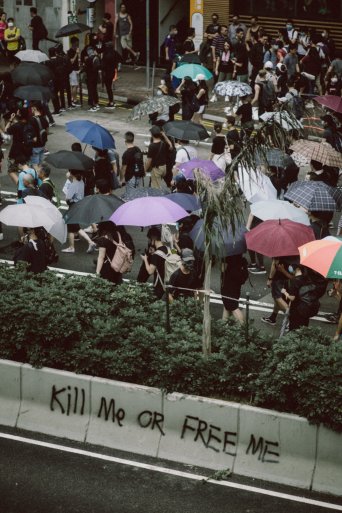- About
- Topics
- Story
- In-Depth
- Picks
- Opinion
- News
- Donate
- Signup for our newsletterOur Editors' Best Picks.Send
Read, Debate: Engage.
| topic: | Freedom of Expression |
|---|---|
| located: | Hong Kong, China |
| editor: | Sun Ma |
A rare banner reading anti-communist slogans was hung on a roadside of Beijing just before the supreme political assembly was held for the first time in five years. It read: “We want food instead of PCR tests. We want freedom instead of lockdowns.” Images of the banner quickly went viral on social media, but were just as swiftly removed from Chinese internet. Unexpectedly, no relevant news was found on Hong Kong media.
"We want respect instead of lies. We want reform instead of a Cultural Revolution. We want a vote instead of a leader. We want to be citizens instead of slaves,” another banner read on a bridge in the Haidian district of Beijing, which revealed the people’s substantial dissatisfaction with China’s “zero-COVID” policy, among other issues. Various banners subsequently emerged in different places around the country, while some called for strikes on markets and schools and the removal of the country’s leader Xi Jinping.
The rare protest began on 13 October, three days before the 20th National Assembly of the Chinese Communist Party - a highly sensitive moment accompanied by heightened security measures around the capital, as well as online. Posts with the keywords “Beijing,” “Haidian” and “bridge” were soon censored on Chinese social media, as most would have expected.
In fact, the protests in China occurred as a result of citizens’ frustrations with the high-pressured lockdown and intolerant leadership. The voicing of the citizens’ discontent is especially appropriate, and deserves its due respect, given the shortages in food supply engendered by the lockdown measures - a reckless mismanagement that must be addressed. Meanwhile, the recent 20th Communist Party Congress was a missed opportunity for government leaders to respond to their citizens’ frustrations.
Also unusual is the lack of coverage of these protests on any mainstream media in Hong Kong, which is known as one of the country’s relatively liberal cities that grants a certain permission for press freedom. In fact, Hong Kong used to be the only city in China that could host memorials for the anniversary of the 1989 Tiananmen Square massacre. The organisation of the memorial, however, has not been permitted since 2020, the year when the national security law was passed, which puts opposition voices at risk of being arrested - including journalists who report on dissident citizens.
Pro-democracy news media like Apple Daily and Stand News were dissolved last year as China tightened its grip on Hong Kong’s freedom and democracy. While pro-government media have expanded their production, other media outlets have seen their management replaced, either shut down or transformed into government mouthpieces.
Hong Kong news media’s silence on the anti-communist protest in China is only another example of the China-Hong Kong synchronisation: despite the one-country-two-systems framework that is supposed to allow Hong Kong a high level of autonomy, Beijing nevertheless seems to decide many policy directions in Hong Kong. The Chinese lockdown policy that Hong Kong is forced to follow has also caused many people in the international financial centre to struggle, including local workers and foreigners. This does not only change the special administrative region, but also takes away the basic rights of the people.
Hong Kong’s prospects for press freedom remain dim as people’s knowledge of current events now relies mostly on foreign media that escapes the high levels of Chinese censorship.
Photo by Joseph Chan

